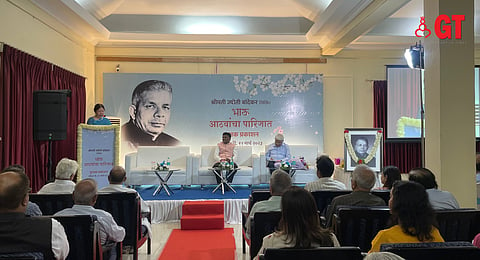

The legacy of Bhausaheb Bandodkar, Goa's first chief minister, lives on. Bandodkar was the guide of the Bahujan community in Goa and went beyond the law to help make their lives better.
His legacy has been well narrated in the book, Bhau Aathvancha Parijat, which was released on Sunday at the hands of Speaker Ramesh Tawadkar on the occasion of his birth anniversary at the International Centre Goa in Dona Paula.
The book is penned by the late chief minister's youngest daughter, Jyoti Bandekar. Speaking on the occasion, Jyoti Bandekar in her short introduction to the book said, “I feel like I have repaid the huge debt I owed to my father, for bringing us up so well.”
According to Bandekar, her father always praised the poetry and articles that she wrote as a school girl. “It is this happy memory that finally proved to be the driving force to write this book,” Bandekar said.
Several dignitaries from the field of Goan politics, business, industry and social life graced the occasion on Sunday. Tawadkar, who was the chief guest, asserted that it was necessary for 40 MLAs of Goa to understand the image of Bhausaheb, who is an ideal role model for present-day politicians.
He said “Bhausaheb was a son of the soil and a villager at heart. He wanted the poorest Goan to be educated and hence set up schools across the length and breadth of the state. We need to emulate Bhausaheb and follow in his footsteps.”
Citing the lessons, he had personally learnt from Bhausaheb’s life, Tawadkar said, “In my own constituency of Canacona, I have initiated the system of Shramdaan where every citizen is encouraged to contribute to the social development of his/her village and town.”
Complimenting Jyoti Bandekar for writing the book on her father, Tawadkar said, “A lot more still needs to be written on Bhausaheb to encourage and motivate the future generations of Goans.”
Somnath Komarpant, a renowned writer, who was guest of honour at the event, also complimented Jyoti Bandekar for writing the book and said, “To be able to write about Bhausaheb in such a precise and concise manner is a huge achievement.”
According to Komarpant, the book and the many anecdotes mentioned in it, reminded him of his own happy memories of Bhausaheb which he had experienced as a youngster.